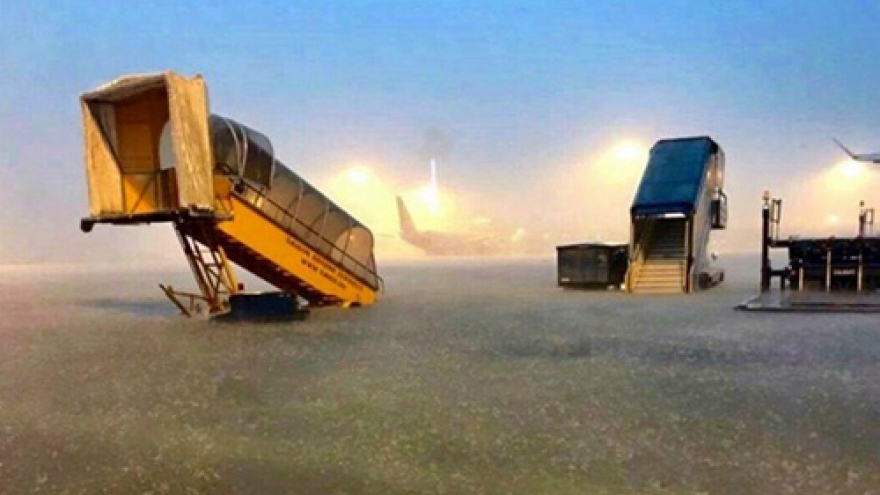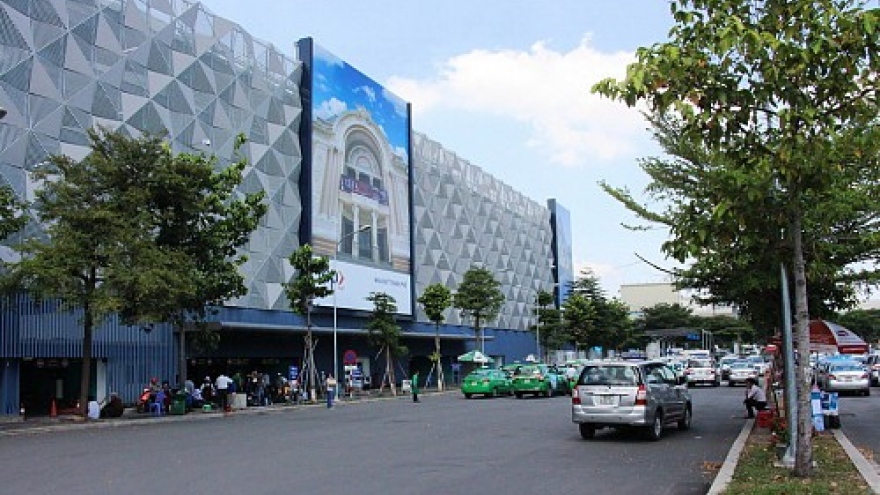Deputy PM: Tan Son Nhat Airport must expand
The capacity of Tan Son Nhat International Airport will double as many projects to expand it and ease traffic congestion have been announced, a high ranking official said.
 |
The most significant headway for expansion efforts was made after the Ministry of Defense agreed to move all military training operations out of the three major air hubs - Tan Son Nhat, Noi Bai, and Da Nang airports, according to Lai Xuan Thanh, Director of the Civil Aviation Authority of Vietnam (CAAV).
The acquired military land will be used to build an additional runway, allowing the airport to gradually increase its capacity to 38 million passengers per year by 2019, Thanh said.
At the same time, the aviation industry has implemented a parallel flight route North to South and shifted from flight equipment to satellite by the end of November 2016. That has reduced 24 per cent of waiting for flights and 42 per cent of flying times.
“The aviation industry will try to seek investment to upgrade the airport,” Thanh said.
The ministry of Transport instructed the Airports Corporation of Vietnam (ACV) to expand current T2 international terminal to accommodate three million additional passengers, raising the total capacity of its two terminals to 28 million.
A 21-hectare area of military land will be handed over to the Ministry of Transport to expand Tan Son Nhat’s current jet parking space and allow for up to 96 planes to park at a time.
A new mixed-use terminal with a capacity of ten million passengers per year is expected to commence construction in the first quarter of 2017 and be completed within 12 months, according to CAA. The terminal will be built over three hectares of former military land.
Upon its completion, the three terminals of Tan Son Nhat airport will boast a total design capacity of 38 million passengers a year.
A plan is also taking shape to erect a fourth terminal, expected to span 15 hectares over current military lands and serve up to ten million passengers per year, raising Tan Son Nhat’s capacity to 48 million, CAA estimates.
“To increase capacity for Tan Son Nhat Airport, local authorities must review and set a compensation plan,” Deputy Minister of Transport Nguyen Nhat told the Tuoi Tre (Youth) newspaper.
But Nhat noted that this will depend on how HCM City invests and improves its traffic situation to the airport.
“It is not so difficult to invite investors for Tan Son Nhat Airport’s expansion but the most important thing is how to arrange land funds for more transport roads,” he added.
Tran Doan Mau, Director of the Southern Airports Authority, suggested establishing ’satellite’ transfer stations located near Tan Son Nhat airport to ease overcrowding in its terminals.
“The stations would serve as satellite terminals, with fully integrated information desks, parking lots, check-in counters, and waiting rooms for passengers to await their flights.
Shuttle buses would run between these stations and the airport to transfer passengers directly to their boarding gates,” he said.
Possible locations for these stations include Gia Dinh Park and Hoang Hoa Tham Street, 500 meters away from the airport.
“Such stations can be built in six months at a cost of 500-700 billion VND (22-31 million USD), compared to 3-4 trillion VND (134-179 million USD) and three years to build a full terminal,” he explained.
With less than one month away from the country’s biggest holiday season of the year, Lunar New Year, Tan Son Nhat airport is expecting an influx of passengers in the weeks to come.
The airport is expected to welcome over 2.5 million passengers between January 20 and February 10. Nearly 800 fights will go through the airport on a single day during the season’s peak, ACV said, with the number of daily passengers reaching over 123,000, an increase of more than 11,000 passengers from 2016.
Tan Son Nhat is already overstrained by the steady flow of flights and passengers. It received more than 26.5 million passengers last year and the number is expected to increase to around 31 million this year, making an upgrade an even more urgent task.
Rapid growth of the local aviation market in recent years, with 650-750 flights coming and leaving the airport every day, has overwhelmed airports in major cities and led to regular flight delays and cancellations.
Figures from the CAAV showed that more than 20,000 flights, or 15.8 percent, were delayed, in the first six months this year. That was up slightly from 15 percent a year ago.
Tan Son Nhat has more problems to deal with apart from rapid passenger growth, with flooding right on the tarmac and traffic congestion on the streets outside causing chronic delays.
With 32 million passengers passing through the airport in 2016, the airport is far surpassing its design capacity of 25 million air travelers.
With eight more years until Long Thanh International Airport in the nearby Dong Nai Province, the designated successor of Tan Son Nhat, is expected to be completed, officials are working on a way to help alleviate the load.



